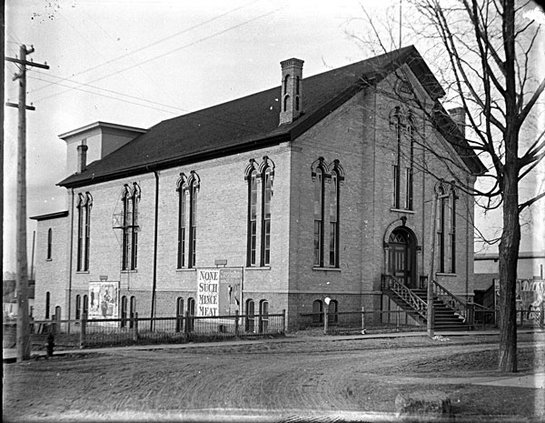Two columns were printed a few weeks ago about the Germans forming the Turnverein and building the original Turner Hall in Monroe. I received a phone call from Tom Fey a few days after the second of those columns was published. He wondered if I had noticed in my readings that the more conservative New Englanders who settled the area became upset with the Germans who were not honoring Sundays the way it should be after the hall was built. I looked back at the papers that he suggested and felt it important to share that information here.
A letter to the Monroe Sentinel, signed by Veritus, was printed in the Monroe Sentinel on December 15, 1869. It started, “Allow me to call attention to a new institution — near to us — whose advent is of quite recent date among us. We refer to the Sabbath evening entertainments at Turner Hall.” He went on to say that they had heard of the Turners existing where there were populated areas of Germans, “and to tell the truth, we have never heard any good of it.” He added, “In looking over its history we fail to find any good, but much of evil growing out of it.” He mentioned the Sabbath evening concerts in a public hall with an “open bar, liquor-drinking, and smoking — the exhibiting of tableaux and charades for mere entertainment, the singing of comic songs, with plenty of loud cheering intervening, is certainly a very great innovation upon our mode of keeping the Sabbath.” He asked if it could “be defended consistently with the moral welfare of the people?”
A letter was printed the following week, signed by “Turners.” They felt that Veritus should have attended at least one of these entertainments “before he called them a ‘curse,’ thereby insulting a great many as good and moral men (who attend them) as he is. If he is as anxious to know as he pretends to be, he is welcome to come and see. The doors are open for all respectable and well-behaved persons; but, if he thinks it will hurt his morals, he is at liberty to stay away.”
Then he addressed the editors by saying, “We congregate at our hall for our own entertainment, and, we can assure you, not for immoral amusements. We do not ask the support of men like ‘Veritus,’ who claims that he does not know what it is, and at the same time calls it demoralizing, and a curse, because it does not suit his puritanical notions. All we ask is ‘the right to worship Almighty God according to the dictates of our own consciences,’ and we shall certainly not disturb anybody in their way of keeping the Sabbath.” They thanked the editors for the use of their columns and signed off.
Another letter, simply signed “R.,” wasn’t quite as polite. He said that the letter from Veritus “is a capital illustration of that carping, self-righteous element in American society which, though not by any means blameless in itself, is continually ‘nosing’ about among its neighbors, looking for their faults, holding them up, and calling upon the people to condemn them.”
He concluded his letter with a paragraph that contained an extremely long sentence. “The Germans, like Americans and all other nationalities, love the customs of the land of their birth; they cannot be made to understand that a proper interpretation of their rights, under a Government as free as ours, involves an interference with the enjoyment of these customs; and, although they are, by their mental constitution, disposed to aid in the progressive development of free institutions in this country, this factious opposition to their habits is continually forcing them to take sides with the reactionary party of the country, and delays that assimilation with our own society which time and a due regard for their feelings and rights alone can effect. So long as the Germans do not interfere with the rights of others, they cannot be compelled to conform to our notions of propriety; and all attempts in this direction are simply futile and mischievous.”
The Sentinel reported on December 29 that, “The Turners have decided to have no more beer or liquor at their Sabbath evening entertainments; but to conduct them upon the plan of a Lyceum Concert, to which only those who can behave like gentlemen will be admitted.” The editor added that he felt that there would be no interference from the people if this programme was carried out.
The editor also added, “A common regard for the wishes and rights of others is the fundamental basis of society and Republican government. True liberty implies concessions from all parties.” He also shared that several leaders of the Turnverein had protested against opening the bar at Turner Hall on Sunday evenings, but it was always opposed. He concluded, “A concession on both sides is demanded. Shall it be made?”
I saw no more articles in the paper about this controversy; Turner Hall still operates, so it appears that the two factions compromised and made it work.
— Matt Figi is a Monroe resident and a local historian. His column will appear periodically on Saturdays in the Times. He can be reached at mfigi48@tds.net or at 608-325-6503.



